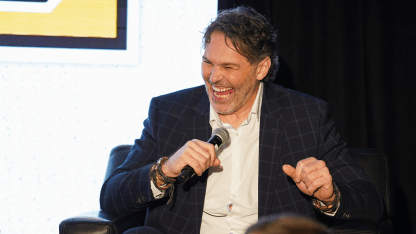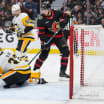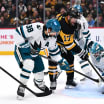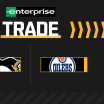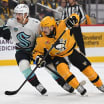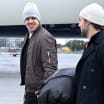Steigerwald brought up how Jagr’s jersey is going to hang alongside Mario Lemieux’s No. 66, who Jaromir idolized before arriving in Pittsburgh.
Well, what happened was for us kids in Czech, there was only one goal: to make a national team. That was the best thing that could happen to anybody, to play for your country, for the national team. There's not many hockey players who reach it, but as a kid, that's what you watch. You watch the World Championship. Every game the Czech national team plays, you watch it. But I was watching other hockey, I was watching Canada and Russia, because the Russians always had the best team for the World Championship because the professionals didn’t go. There was a game in 1985, the Russians against Canada. Canada surprised by beating the Russians 3-2, and Mario scored two goals. Because Canada beat Russia, the Czechs had a chance to win the gold, otherwise they wouldn't have had it. So, everybody was rooting for Canada. That game, it was happening at like, 10 o'clock at night. My parents were already sleeping. I was the only one in the family who watched the game, and that game, he scored two goals. In school, we had the tables and you couldn't write on it – but everywhere, I put Lemieux, Mario Lemieux, on the table. I was crazy about him. I wanted to talk about it Sunday, but if we are here, I’m going to say it. I always believe in God. I always believe in a higher power. I always believe that whatever you wish, it's gonna happen. Back then, I wished one day I could play with him. In 1990, it happened. For me, Mario, he was always the guy. I always wanted to be the best, but not when I competed on his team. I didn't mind finishing second. I don't know why, that's the only guy I didn't mind finishing second to. I knew like, if he is going to play, I'm never going to get the scoring title. I knew it, and it never happened. I didn’t even mind. I respected him too much, I didn’t even want it.
Legend has it that Jagr told the four teams ahead of Pittsburgh in that 1990 NHL Draft that he wouldn’t come over because he wanted to play with Mario. Steigerwald asked if that was true.
“I would say it’s halfway true. I told three teams I was going to go to the army. Back then, the army was for two years, so they didn’t want to take the chance to draft me. But I had a meeting with Philadelphia and I have to meet everybody. Bobby Clarke was the GM back then. It was like three days before the draft and Bobby Clarke really wanted to draft me. He got fired the day before the draft, so they changed their mind. Otherwise, I would go to Philly. He got fired, then Minnesota hired him, I think the year we played against them (in the 1991 Stanley Cup Final). That's what happened. Otherwise, I think that would go to Philadelphia, because he really wanted to draft me but he got fired a day before the draft. Craig Patrick took me, and the rest is history. But to be honest, I was surprised Philly didn't take me at four.”
Jagr was the first European player to come over to Pittsburgh, and he remembers that no one was quite sure what to expect.
Nobody knew how to treat me, didn’t know how much it was going to affect (things) if I didn't speak English. So, Craig said, listen, I don't care if you’re not going to play the first two months, if you're going to be out of shape. The most important thing is to go to school and learn English as quickly as possible so you understand your teammates, and you understand the coaches, what they are talking about. So I came there to the Berlitz school for six weeks, six times a week, from eight o'clock till four o'clock. I didn't have a break. It was like, I couldn't look at a dictionary. They took all my dictionaries away. They just showed the pictures and repeated over and over. Like one hour, one teacher would come. They changed it after one hour. Eight teachers and a day. I had to listen, listen, listen. After five weeks, I said, I’m done. I left.
(Steigerwald: And he started watching television!)
Married with Children, that's a very good show! That was my favorite show.
Bourque said their locker room was unique in the sense that it was filled with alpha males who didn’t mince words, and wondered if Jagr picked up on that despite not knowing much English.
Well, I didn’t pay much attention [laughs]. I was scared! I love the game, so I didn’t mind it. I was practicing a lot. Practice was over, I stayed there for two hours, I just lived my dream… I learned from you guys (gestures to his teammates on stage). And I was homesick, I'm not gonna lie about it. Steigy said how tough it was for me, and let me explain. There was no cellphones. There was no FaceTime. Now, it's easy. When the kids leave the house, you can call them on FaceTime. My family did not have a phone. I could call on Sunday, we had a time on Sunday, nine o'clock in the morning. That was the only time I could talk to my parents. A few times, I was crying and I wanted to go home. My dad said hey, listen, you gotta have patience, that’s the way it is. I roomed with Bryan Trottier, he’s always been nice, and he understood I couldn’t speak English. So he tried to get a dictionary and tried to explain everything to me. He had the patience to do it. Maybe if I would have had a different guy for a roommate, he wouldn’t have been patient. But he was very smart, very nice to find a way for me to understand. If I didn’t understand, he tried to explain to me, on the ice and off the ice.
Ultimately, Jagr embraced his new home, becoming famous - or infamous, depending on how you look at it - for his love of sports cars (and driving fast).
I didn't have that much freedom in Czech, it was different, I couldn't do much. Then I came here, the city, the people just helped me. I felt like I was unstoppable. That’s the young people attitude. I felt like I could do anything I want. I'm not saying I was always doing the right thing. I'm not an angel, I knew it. But nobody stopped me back then [laughs]. Bourquie was, I’m not saying the same way, but you gotta have fun. Like, we had fun. Even the practices that we worked hard.
Jagr was very appreciative throughout the course of the night, reflecting on the people in Pittsburgh like Trottier who helped him along the way. Jagr called Rick Kehoe, a Penguins assistant coach at the time, “a perfect, perfect guy” for helping develop his shot. “We would shoot 200, 300, 400 pucks after practice. I couldn't shoot at all, and I felt like in three years, I had one of the best shots in the NHL. If you practice, everything's possible." He talked about Jiri Hrdina, acquired from Calgary to ease the rookie’s adjustment to the U.S. Jagr movingly addressed the guys on stage with him for the influence they had. And he spoke highly of his first NHL coach, the late Badger Bob Johnson, who died of brain cancer the summer after leading Pittsburgh to its first Stanley Cup in franchise history.
I didn't speak English, so I cannot really talk about his knowledge. But what he did for me, it was, it doesn't matter if I had a bad game or a good game, you know, I always keep playing, on the fourth line. He never sent me to the minors. Even (if) maybe I deserved it, I don't know. But he always kept me up in Pittsburgh, and then he give me a chance. Doesn't matter if I make a mistake or not, I play the next day. That was probably the best thing that happened to me. He didn't want to punish me, to scratch me or not play me or send me down. He was a teacher for me.
Bourque talked about how Jagr’s belly was never full, that he was always starving to be the best. “I was like wow, he wants it more than anybody else on the ice, and there’s a bunch of guys that really want it. And how can you always be that hungry? That’s what always surprised me, and at age 43 with the Florida Panthers, scoring 27 goals and 60-some odd points – that’s unheard of. And you were still starving... everybody’s got drive to get to the NHL, but you were different.”
If I can say some stuff about that. I don't know how many guys saw ‘The Last Dance’, Michael Jordan. I'm not saying I’m like him, but it's motivating me when they said you cannot do it, you are too old. You are 42, you cannot play anymore. That motivated me. I wanted to prove them wrong. This is not about age, it's about work ethic. Stay healthy, blessed by God, and work ethic. … Thank God for perfect timing. I'm going to try to explain what I mean to have perfect timing. So, when I was in Czech Republic, the level compared to the NHL is little bit lower, no question about it. NHL is the highest league, and they play the best hockey players in the world. But I started playing when I was almost 16, struggled the first year, second year I was okay. Third year, I reached the top, I was one of the best players. All of a sudden, I got traded. I went to NHL, and again, I have to drive, I have to push myself to get to the next level. I didn't have years when I stuck somewhere. I always had to push myself. When I hit the top in Czech, I got drafted, and I came here and I was on the fourth line. I have to push myself again. What kind of player I am right now, you guys had a big effect on me, the way you guys work. People don't know, but I remember when other teams come to the town and they watch us, we had no helmets, we had no shoulder pads, everybody was making fun of us. And we had a lot of freedom to do it. But the practice was over, the whole team stayed, over half of the guys – and do stops and starts, blue to blue for 30 minutes. Nobody else do it. And other teams, the practice was over for them. They went to the dressing room. Not us. We were competing, like who’s going to leave the ice first, and nobody wanted to leave. Same thing when guys were riding the bike. Paul Coffey, he was the biggest influence on me in how I have to practice. He took me to the gym and he said listen, from now on you're gonna do the bike, you’re going to do sprints, one minute on, one minute off. It was the hardest thing I ever did in my life. I couldn't say no to him. I was puking a few times, I couldn't handle it, but I have to do it. He said you got to do it, so I did it. That was a next step. Because before, I thought I was working hard, but he showed me another level. And there’s a next level, next level. That’s what pushed me.
Finally, Steigerwald brought up how Jagr got traded after winning his fourth straight scoring title in 2000-01. “I believe you would have been a Penguins fan for your entire career if not for the business of hockey being sick at that time… the Penguins were in bankruptcy, the league was headed for trouble. I could feel the pressure on you, Jags – you were feeling the weight of the entire franchise on your shoulders, were you not?”
I didn’t really have a chance to explain what really happened. Only me and Craig Patrick know what happened. You mentioned it was my fourth scoring title. If Mario that year wouldn’t have come back, I would not have won. I didn’t play very good, we didn't have a really good team. Mario announced the comeback. He came back on December 27, I think that was the day. I think Kevin came back, I remember that was the same year we played together – Kevin, Mario, me. All of a sudden we start clicking, and I won the scoring title. By a lot of points, too. But before Mario came back, I was probably 20 points behind the leader. So, I don't think I would win it if Mario or Kevin wouldn't have come back. But I didn't really have a good playoffs, I just didn't feel good. We got in the semifinal and our second line was Marty Straka, Alex Kovalev and Robert Lang. They were all good players, but they were all free agents. I felt like there's no way we can sign them. And, you know, my salary was pretty high. Mario came back, there’s no reason to keep me. That's what I said, there's no reason to keep me because if Mario's here, the fans will come to watch him. If I’m going to be here, okay, but if we cannot sign those three guys, we're not going to be better than we were last year. There is no way, you know? And I talked to Craig Patrick after the season. I said, listen, Craig, I know it’s tough for you to trade me because you the guy who drafted me, you were like a father to me. I knew it. I could see it, because he was like a father to me. I didn't have a father here, and he was like a father to me. I don't think he would ever trade me, I don't think he would. But I told him, hey listen, you know – let's do it this way, it's gonna be good for the organization. Maybe it's gonna be good for me. I'm gonna take the pressure from you. I'm gonna say, I want to be traded. I think he was talking to Mario, and it just happened. But maybe it's meant to be... you never know. It was tough. I don't know what's gonna happen with me, because I feel I'm still a good player. But if you change the team, you start playing with different people, different players, and they treat you differently. They’re not used to what you like to do, they don't give you the same freedom. They are expecting the same numbers, it doesn't work. So, I'm not saying I wasn't happy in Washington, but all the circumstances there, it didn't work for me. Then I got to New York and it was totally different, it was totally the opposite… all of a sudden, I had the attitude back to prove everybody I'm still a good player. That’s the story about Pittsburgh. I didn’t really have a chance to explain. Maybe it was bad communication with everybody, but I thought that back then, that was the best thing for the team… maybe people say I’m lying, whatever. I've got no reason to lie. Why would do it? You guys did everything for me, and everybody forget already, so it doesn't matter what I'm saying right now. I don't think you're going to change your opinion about me right now. It happened years ago. But this is the story.
You wanted the Penguins to be successful, and you were willing to walk away from it just to essentially help the franchise stay afloat. And it was really bad at that time. We were in big danger of not being there after that last season you won the scoring title.
Everything happens for a reason, maybe Sid wouldn’t be here right now, Malkin… sometimes you have to suffer to feel great later. That’s the life. You gotta have the patience to suffer, because great things are going to happen later.

